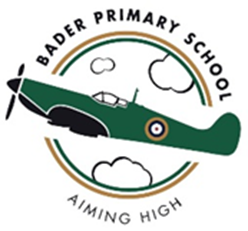Writing
Curriculum Statement for the teaching and learning of Writing
Intent
‘Writing is thinking. To write well is to think clearly. That’s why it is so hard.’
David McCullogh
At Bader Primary, our aim is to ensure all staff encourage children to appreciate our literacy rich environment, and in doing so develop a positive attitude towards writing. Throughout school, we endeavour to ensure that children develop a flair for writing through creative and inspiring teaching and are aware of the importance of planning, drafting, editing and improving. It is our intention that children are aware of a wide range of genres and know what features they should include. When children write, our ambition is that they write with a clear purpose and audience in mind.
Implementation
At Bader Primary school, we believe that writing is an essential life skill that every student should learn and develop throughout their academic career. Therefore, we have implemented a comprehensive writing curriculum that caters to students’ needs from Reception to Year 6.
Our writing program is designed to meet the requirements of the National Curriculum of England, which includes the three main components of writing – text structure, grammar, and vocabulary. To achieve this, we have structured our curriculum around the following key areas:
- Planning and Organising: Students learn to plan and organise their writing, including brainstorming, mind mapping, and creating outlines.
- Composition: Students learn to create different types of writing, such as narratives, persuasive texts, and non-fiction reports, using appropriate language, structure, and features.
- Vocabulary: Students develop their vocabulary through reading, using a range of texts, and explicit vocabulary instruction.
- Grammar and Punctuation: Students learn the rules of grammar and punctuation and apply them in their writing.
- Editing and Proofreading: Students learn to revise and edit their writing, with a focus on spelling, grammar, and punctuation.
We believe that our comprehensive writing curriculum provides our students with the knowledge and skills they need to become effective and confident writers. We continuously monitor and evaluate our curriculum to ensure that it meets the needs of all our students and is in line with national standards.
Impact
The teaching of writing has a significant impact on pupils’ academic and personal development, by enabling them to communicate effectively, express their ideas clearly and coherently, and develop their metacognitive skills. By providing pupils with a sound understanding of the principles of writing, and the necessary skills to articulate their ideas in written form, schools can help pupils to:
- Improve their academic performance, by enabling them to write effectively across the curriculum, and to meet the expectations of examiners and assessors.
- Enhance their communication skills, by enabling them to express their ideas more clearly and coherently in written form, and to communicate effectively with others in a range of contexts.
- Develop their metacognitive skills, by encouraging them to reflect on their own writing processes, and to use strategies for planning, drafting, revising, and editing their work.
- Boost their confidence and self-esteem, by enabling them to become more competent and confident writers, which can have a positive impact on their overall academic performance. 5. Enhance their critical thinking skills, by enabling them to analyse and evaluate texts, and to develop their own arguments and perspectives in response.
Curriculum Statement for the teaching and learning of Spelling
Intent
‘Words cast spells. That’s why it’s called ‘Spelling’.’
Unknown
The intent of the teaching of spelling at Bader Primary School is to equip pupils with the necessary skills to accurately transcribe their ideas into written form, while also developing their ability to segment words into their individual sounds and identify the appropriate graphemes to represent these sounds. This will enable pupils to become confident and competent spellers, which is essential for effective written communication and to avoid unnecessary demands on their working memory. The teaching of spelling should be explicit, with a focus on the alphabetic code, morphology, and etymology.
Implementation
To effectively implement the teaching of spelling at Bader Primary School, the following steps have been taken:
- Ensure that teachers have a sound understanding of the principles of effective spelling instruction, including the role of phonics, morphology, and etymology in spelling, and how to teach these explicitly.
- Use a structured and systematic approach to the teaching of spelling, which is tailored to the needs of individual pupils. This approach should include regular assessment of pupils’ spelling skills, and the provision of targeted feedback and support to help pupils improve.
- Provide pupils with a range of opportunities to practise their spelling skills, such as through the use of dictation exercises, spelling games, and writing tasks that require them to use and apply their spelling knowledge.
- Encourage pupils to take an active role in their own learning by providing them with strategies for self-assessment and self-correction, and by promoting a growth mindset approach to spelling.
- Ensure that spelling instruction is integrated into wider literacy teaching, with a focus on using and applying spelling skills in meaningful contexts.
- Provide teachers with ongoing professional development and support to help them develop their own knowledge and skills in spelling instruction, and to keep up-to-date with the latest research and best practices. 7. Monitor and evaluate the effectiveness of spelling instruction on a regular basis, using a range of data sources to inform decision-making and identify areas for improvement.
Impact
The teaching of spelling has a significant impact on pupils’ literacy development and their ability to communicate effectively in written form. By providing pupils with a sound understanding of the principles of spelling, and the necessary skills to accurately transcribe their ideas, children at Bader Primary are able to:
- Improve their written communication skills, by enabling them to express their ideas more clearly and accurately in written form. Source:
- Enhance their reading skills, by improving their ability to decode and recognise words, and to make connections between spelling and meaning.
- Boost their confidence and self-esteem, by enabling them to become more competent and confident spellers, which can have a positive impact on their overall academic performance.
- Develop their metacognitive skills, by encouraging them to take an active role in their own learning, and to use strategies for self-assessment and self-correction.
- Reduce the demands on their working memory, by enabling them to become more automatic and fluent spellers, which can free up cognitive resources for other aspects of writing. Overall, the teaching of spelling is an essential component of a high-quality literacy curriculum, and at Bader Primary has a significant positive impact on pupils’ academic and personal development.

